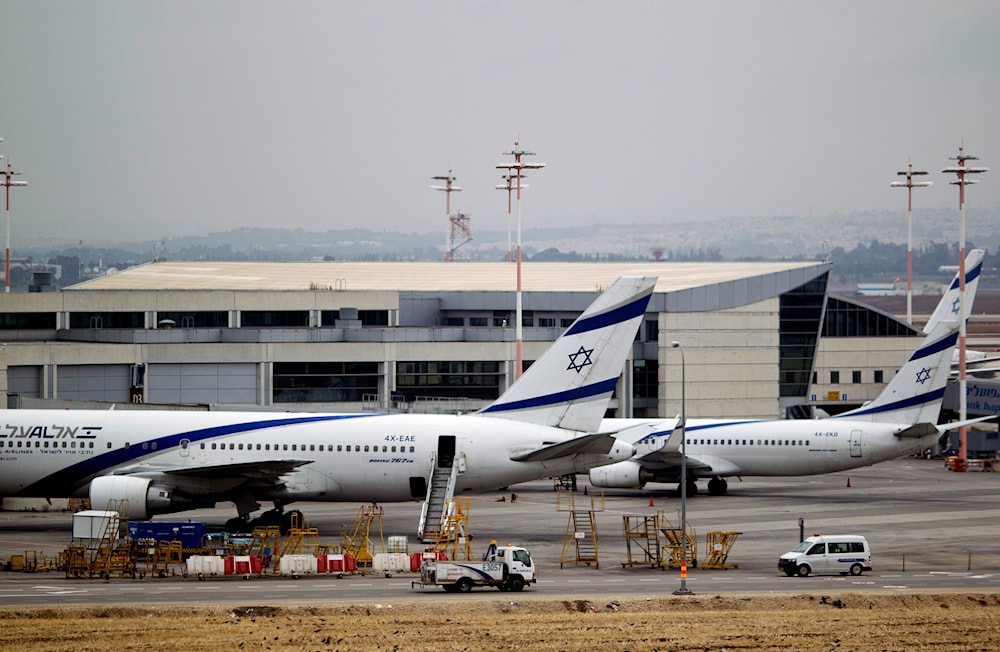Private airplane previously used by Israeli Mossad lands in Riyadh
An Israeli private airplane, which was previously used by high-ranking officials in the Mossad, landed in Saudi Arabia in possible prelude to normalization talks.
-

In this April 21, 2013, file photo, Israeli El Al planes are parked at Ben Gurion airport near 'Tel Aviv', occupied Palestine (AP)
An Israeli private plane landed Saturday in the Saudi capital, Riyadh, which was recently used for travel by senior Israeli Mossad officials, the Israeli Makan public broadcaster reported.
The plane's landing came a day before US Secretary of State Antony Blinken is slated to visit Saudi Arabia.
According to Makan, the plane took off Saturday from Ben Gurion Airport, and stopped temporarily in the Jordanian capital Amman, from where it continued its trip.
Senior Israeli officials will likely be on board the plane to hold talks on normalization with Saudi Arabia, the Israeli broadcaster said.
Moreover, it was revealed that the plane belonged to an Israeli businessman, and was used in recent months for official trips by senior Israeli officials in the Mossad and the Shin Bet.
The private airplane was additionally used by Israeli officials as part of the talks in Cairo and Doha regarding the prisoner swap deal.
About two weeks ago, The Wall Street Journal reported that the Biden administration was trying to conclude a diplomatic deal aimed at pressuring Israeli Prime Minister Benjamin Netanyahu to recognize a Palestinian state in exchange for normalizing relations with Saudi Arabia.
A source in the Saudi royal family told Makan that the ball was now in Netanyahu's court, and he must choose between peace with Saudi Arabia and solving the Palestinian issue or continuing the conflict with the Palestinians without peace with Saudi Arabia.
October 7 obstructed normalization
Yoel Guzansky and Udi Dekel, two senior researchers at the Israeli National Security Research Institute, completed a study examining the issue of Israeli-Saudi normalization, which has been constantly obstructed since Operation Al-Aqsa Flood was launched on October 7, 2023.
According to the researchers, "Israel", after six months of the war, is now faced with making a strategic decision that combines ending its genocide in Gaza [which includes the complete reconstruction of the Strip and ensuring its stability], sealing the deal that normalizes bilateral relations with Saudi Arabia, and pushing for a solution for what the institute labeled as the "Israeli-Palestinian conflict".
The study mentions that this aids "Israel" in its quest to enhance relations with Saudi Arabia and the United States.
Read more: Why is Saudi Arabia open to normalize relations with 'Israel'?
Dekel and Guzansky noted that "Israel" would greatly benefit from normalizing ties with Saudi Arabia, including Saudi Arabian interference in Palestinian affairs, particularly in managing Gaza and rebuilding it after the war.
They added that although the onslaught in Gaza was still ongoing, political calls aimed at establishing official ties between "Israel" and Saudi Arabia did not stop, with constant brokering by the United States. The researchers claimed that Hamas managed to obstruct the normalization process by launching its October 7 operation.
Dekel and Guzansky stated that "Israel" is demanding increased Saudi Arabian intervention in the Palestinian sphere exhibited in the reconstruction and governance of the Gaza Strip and handling the popular and public opinion that has solidified against "Israel" among vast Arab communities.
For instance, Saudi Arabia would have to handle 90% of Khaliji citizens, including Saudi Arabians, who oppose the normalization of relations with "Israel".
In this context, however, the researchers warned that the gap between governmental policies in the Gulf, and the public opinion of the citizens of the Gulf, is only expanding, particularly when it comes to the Palestinian cause.
The researchers pointed out that against the backdrop of the war in Gaza and its outcomes, changes have occurred in the conditions of both parties (Israeli and Saudi) for signing a bilateral normalization agreement. Saudi Arabia now insists on signing defense agreements with the United States against Iran, and on obtaining assistance [and approval] from it to establish civilian nuclear infrastructure without Israeli objection. Saudi Arabia also wants to ensure an Israeli commitment to continue enhancing the "two-state solution" and establish a "renewable" Palestinian authority.

 4 Min Read
4 Min Read











